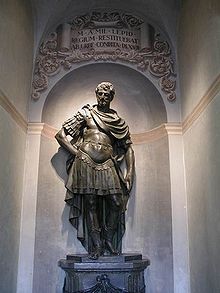Roman censor
The censor was one of the collegiate magistrates of the ancient Roman Republic, specifically by two censors, elected every five years by the comitia centuriata presided over by one of the consuls.
The position, called censorship, was responsible for conducting the census, supervising public morality, and certain aspects of public finances.
Beginnings of censorship
The functions of the censor were initially entrusted to the consul, who could delegate them. Later, the two censors were created, elected every five years from among the senators who had served as consulates, this magistracy constituting the culmination of their career or cursus honorum. The first censors were chosen in the year 443 a. C. They were exercised every five years and at the end a purification ritual was performed with several sacrifices called lustrum. Their powers consisted of reviewing the list of citizens, that of the Senate, and deciding which public works were to be be paid for by the Republic in the following five years.
His tasks were carried out for eighteen months and ended with the performance of the lustral ceremony, leaving office immediately afterwards.
At the end of the 3rd century B.C. C. was the most important magistracy in Rome. Until 403 B.C. C. the censorial magistracy corresponded exclusively to the patricians, being able to later exercise it the plebeians or patricians indistinctly.
The censor since the 2nd century BC. c
From 190 B.C. C. it was established that the censor should have previously passed through the lower magistracies, and that between each magistracy there should be a predetermined period of inaction, which made access to the position difficult for anyone who did not come from the aristocracy, as the magistracies had a hereditary family tradition.
Censors distributed positions according to wealth. Thus the censors became an instrument of the Senate and the aristocracy. With power in the Senate, in censorship and in the equestrian order, the aristocracy controlled all the levers of power.
With the advent of the Roman Empire, Augustus abolished this magistracy, attributing to himself, as emperor, all the functions it had. Occasionally some emperors, such as Vespasian or Domitian, temporarily used this title as a propaganda reinforcement for their performances.
